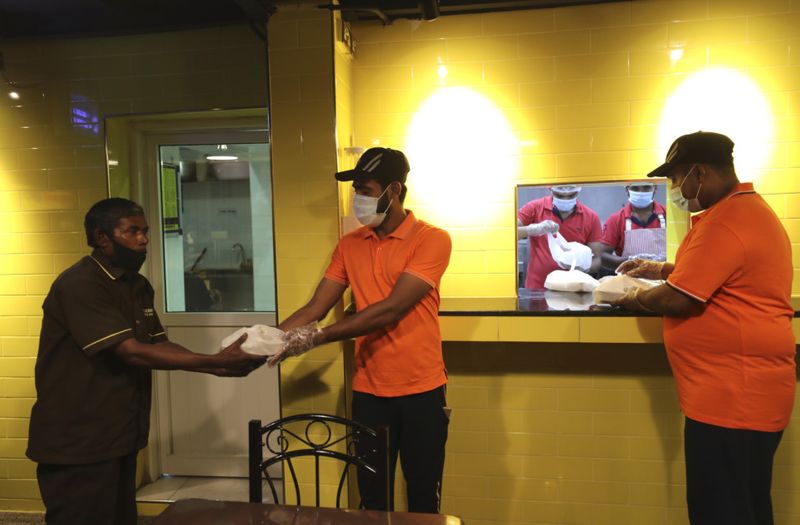Sharjah: At a highway-side restaurant in the industrial outskirts of Dubai, workers methodically assemble packaged takeout meals of biryani rice, dal and brightly coloured chicken curry for the poor and the hungry with little or means to buy food.
It’s not a soup kitchen or a charity drive, but an ordinary hole-in-the-wall Indian restaurant alongside a busy motorway in Sharjah. When other kitchens close for the night, Biryani Spot springs into action. The cooks collect leftover food and repurpose them into free, hot meals for poor, out-of-work migrants, largely from Southeast Asia. Those in need filter through the cramped restaurant at 10pm to receive dinner — no questions asked.
“In the current situation, you have a lot of jobless people, a lot of people who are struggling here because of their low salary,” restaurant co-founder Mohammed Shujath Ali said. “We don’t want to waste our food … We want to give it to people in need.”

Image Credit: AP
A long-cherished dream
As small businesses across the globe were struggling this spring due to the coronavirus pandemic, Ali and his wife were getting ready to open up theirs. A former mechanical engineer, Ali had long dreamt of running his own restaurant, a place where expatriate workers who power the plastic and fabric factories of Sharjah’s Industrial Area 13 could savour familiar Indian, Pakistani and Bangladeshi food at an exceptionally inexpensive prices. Instead of thwarting his plans, the pandemic created an opportunity.
Over its two months of existence, Biryani Spot has mobilised to meet the area’s growing need for food aid. The place serves griddled paratha bread and a range of spiced meat and rice dishes for less than five dirhams during the day — and for nothing at late night. Those cheap or free meals go a long way in helping he needy.
Barely enough
Taj al-Islam, a 50-year-old Bangladeshi carwash worker, has long struggled to make ends meet, earning about $270 (Dh5,316) a month, barely enough to feed his five children back home. He said the free takeout helps him stretch his budget a little longer.
Mohammed Shakeel, a 38-year-old from Pakistan, arrived at night’s end to take the remaining meals back to his mosque about 25 kilometres away in Dubai. After 19 years as a service manager at a luxury car dealership, he was fired in March when the virus struck.
Read more
- Revealed: All the football legends who have been granted UAE gold card visa
- Expert reveals most likely dates for Ramadan, Eid Al Fitr 2021
- Doubles act: The Dubai sisters connection to discover the next Roger Federer at Sofia Open
- Novel awareness campaign by police: A day without traffic fines in Ajman
So far, Biryani Spot’s biggest challenge is getting the word out. The sprawling neighbourhood doesn’t have much foot traffic. Hidden from the street, the restaurant’s small yellow sign is easily missed among rows of ramshackle shops and abandoned buildings. Ali promotes the free food through regular posts in Facebook groups for residents. When people don’t turn up, he packs dozens of meals and drives directly into denser areas, taxi stands or offices where he knows cleaners on their night shifts go hungry. He described the handouts as a “small contribution” to people in need, something that’s built into his faith as a Muslim. “We are just a small-scale business, doing our job, like every human does in his own way,” Ali said.


